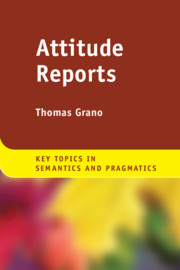5 - De se Attitude Reports
Published online by Cambridge University Press: 15 April 2021
Summary
De se attitude reports are attitude reports that are, in some sense, first-personal from the attitude holder’s perspective. For example, the sentence Beatrix hopes to win reports a situation where Beatrix thinks: “I hope I win.” It would be false in a scenario where, for example, Beatrix, watching herself competing in a prerecorded televised event without recognizing that she is watching herself, thinks: “I hope she wins.” (Compare: Beatrix hopes that she will win, which is true in such a mistaken-identity scenario.) Considerations of this sort have inspired the view that at least some attitude reports involve quantification not over worlds simpliciter but instead over world-individual pairs (‘centered worlds’). We discuss a number of variants of and alternatives to this approach, the ultimate goal being to build a theory that can accurately predict where de se readings of attitude reports are obligatory and where they are merely possible. We also discuss the analytical connection between de se attitude reports and relevant cross-linguistic grammatical phenomena such as control, indexicality, logophoricity, and long-distance reflexives.
- Type
- Chapter
- Information
- Attitude Reports , pp. 122 - 153Publisher: Cambridge University PressPrint publication year: 2021



